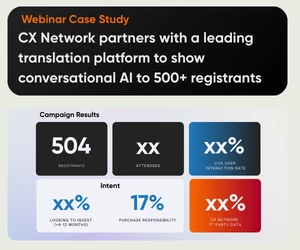6 CX trends that will shape 2024
Forget everything you know about CX – your customers, organization and service suite are about to change in six big ways
Add bookmark
For CX practitioners, 2023 was a rollercoaster. New customer demands, revolutionary new technologies and muted economic growth in major markets were just some of the things keeping practitioners busy. And things are unlikely to calm down in 2024.
Digital CX – the top trend in our 2023 Global State of CX research – will continue to develop with new capabilities paving the way for connected customers with new expectations.
CX consultant Gautaam Borah says: “One of the most significant anticipated trends is the faster and more widespread adoption of CX technologies. We are already seeing virtual product testing using artificial intelligence (AI) in online fashion retail and there will be much more widespread adoption of technologies like AI and machine learning (ML).”
However, 2024 is unlikely to bring a brighter economic outlook as the reduced customer and corporate spending seen in 2023 continues. While CX technologies often bring financial efficiencies, economic conditions are still set to influence CX budgets, meaning practitioners have to deliver competitive experiences on smaller budgets.
Jaakko Lempinen, head of CX for Yle Finland, says: “Despite tighter budgets, consumers will not be willing to compromise on quality. This presents a unique challenge for businesses: They will need to optimize their service processes efficiently to maintain profitability without sacrificing service quality.”
In light of these developments, CX Network has rounded up six trends that are set to change your organization, customers and service suite in 2024.
1. There is a new way to get personal with customers
From their browsing and spending habits to their patience for hold music, customers have changed a lot since the start of the decade, and this is driving organizations to take new approaches to understanding them.
Yvette Mihelic, director of CX for rail operations and maintenance for John Holland Group, says that organizations have already noticed their traditional personas no longer accurately reflect the thinking that drives purchasing behaviour.
She says: “An emerging trend over the last couple of years has been a move from developing customer personas to mindsets. Looking forward, I believe that both personas and mindsets will be developed to provide a high detailed view of specific needs across an experience as well as provide evolving trends based on behaviours that shift over time. The mix allows for improved rigor in solution development that is more aligned to target markets.”
As well as offering products and services that reflect their needs and lifestyles, customers want their interactions with organizations and brands to be personalized and relevant – and those expectations will continue to evolve.
2. AI and LLMs will drive efficiency and engagement
Lempinen expects a surge in hyper-personalization across various industries in 2024. Further to his insights on maintaining profitability during an economic downturn, he says that large language models (LLMs) and AI can help deliver hyper-personalization while also driving service quality at scale.
“With businesses increasingly adopting systems built on top of LLMs, we're entering a robust developmental phase in the quality of services offered to consumers,” he says. “This advancement will gradually reshape customer expectations, depending on the industry and customer base. Companies that fail to meet these evolved expectations may start losing their market foothold.”
At digital cask trading platform Metacask, AI is combined with Web3 technologies including blockchain to deliver hyper-relevant experiences.
CEO Rob Hollands says: “These technologies can be combined to create empowering, optimized and hyper-relevant experiences for consumers and, alongside genuine use cases, will help deliver exceptional customer experience and real-business value. Some may yawn at yet another year of ‘personalization’ dominating the trends write-ups but well-timed, intelligent and hyper-relevant customer experiences driven by the technologies that have emerged over the past few years will lead the way.”
3. Practitioners should approach AI with caution
The fastest moving area of experience management, AI in all its forms is transforming CX, but in 2024 there will be many things for CX practitioners to be cautious of, from customer acceptance to effectiveness and ethics.
Mihelic says: “While ML interactions have come a long way in a short time, the use of AI chatbots is still not trusted by many customers, leading to concern and distrust when customers are interacting with an organization’s online platforms. In the era of efficient and effective digital service channels – and the drive to reduce costs, increase consistency in service and drive revenue – there is still a mismatch between an organization’s desire to introduce AI chatbots, and a customer’s acceptance to engage with AI.”
For Saki Takeda, director of product management and customer service for Netflix, there is plenty of reason to be excited about the new capabilities and efficiencies AI enables for an organization, but the quality of the resulting experience for the customer must not be forgotten. “Personally, as much as I am bullish about AI technology in CX, we also have to be really careful about adoption of AI technology,” she says. “You can automate so many things, but what is the quality of the resulting customer experience?”
“Balancing the level of automation and the quality of the experience, and really testing how much an automation benefits the organization and customer’s experience is going to become more and more important,” she says.
As AI reaches further into CX, organizations must establish an ethical framework to ensure customers understand how, where and why their information is being processed or they are dealing with content generated by AI.
Lempinen says: “Establishing an ethical framework is non-negotiable. Companies must craft and rigorously implement principles for responsible AI usage, ensuring these guidelines are disseminated effectively across the organization.”
4. Generative AI is now available to everybody
It’s clear that generative AI and LLMs will continue to drive new CX capabilities in 2024.
GovindaRaj Avasarala, head of customer experience excellence (CXX) for Vodafone Idea Ltd, says that as companies compete to offer more effortless and intuitive experiences – such as those powered by generative AI, ML and LLMs – it will raise the stakes for CX as a point of differentiation between brands.
“The disruptive wave of Generative AI is bound to bring a pivot to CX. Amidst this, empathy in the form of harmony between human and AI would become the most desired balance,” he says.
These innovations won’t end with hyper-personalization and enhanced chat features. The introduction of custom GPTs in November 2023 has democratized access to generative AI tools for both organizations and their customers.
Lempinen says the next leap in organizational efficiency will come from “bespoke co-pilot” services, enabled by advanced language models. “These services will streamline and diversify human work by automating routine tasks and arch functionalities within organizations could be rehauled with advanced language models reduce the dependency on high-quality metadata.”
5. Get ready for machine customers
The widespread availability of generative AI will have implications beyond the corporate world. As an author and CX expert Sirte Pihlaja, CEO of Shirute and head of team at CXPA Finland, is an authority on the use of AI in CX. Due to the rapid advances around LLMs, she believes 2024 will be the year of the machine customer.
For those who aren’t familiar with the term, a machine customer is the customer version of a virtual agent. Sounds confusing, but in short Pihlaja says that organizations are not the only ones deploying bots to carry out repetitive tasks. The launch of custom GPTs in November 2023 means customers can also now create a virtual agent or digital assistant.
“This will be huge in the long run,” she says. “People want convenience and if one can use a generative AI personal assistant to avoid staying on hold, contest a parking ticket or re-negotiate a mobile contract, why wouldn’t they? I’ll gladly be doing this as soon as possible!”
Pihlaja says everybody should be busy learning new skills to re-design their businesses and experiences for machine customers. If corporations and customers are both using GPTs to communicate, the service function will need major adjustment.
She continues: “If you think of the customer-facing organization, they also have AI assistants. This means the future of service may well become AI to AI interactions. This requires some serious process re-engineering. Companies should already be looking into how to prepare for machine customers. This will be a massive opportunity for those that get it right.”
6. The role of the product manager is changing
With service technologies set to influence so much of the customer experience in 2024, it isn’t surprising that the product manager – the person every vendor wants to meet – will see their role change.
Speaking during CX Talks: Does your customer service function need a PM?, Takeda says the product manager is responsible for leading a product vision, strategy and roadmap for agent technologies that support the customer service (CS) operation.
“The typical PM role is about understanding the business and its challenges, understanding what CS is trying to achieve overall through its vision and strategy, and overall assessing the ecosystem of how many systems we currently have, where the opportunities lie, where can we optimize and where can we bring in technology to support the future vision of the CS organization.”
According to Lempinen, 2024 will see a transformative approach to product management as companies focus more on finding and optimizing their product-market fit. “This requires a unique blend of skills within an organization to innovate in product development, customer experience, finance and technological advancement,” he says. “It's essential for businesses to nurture such multidisciplinary talent to stay competitive and agile in a rapidly evolving market.”































